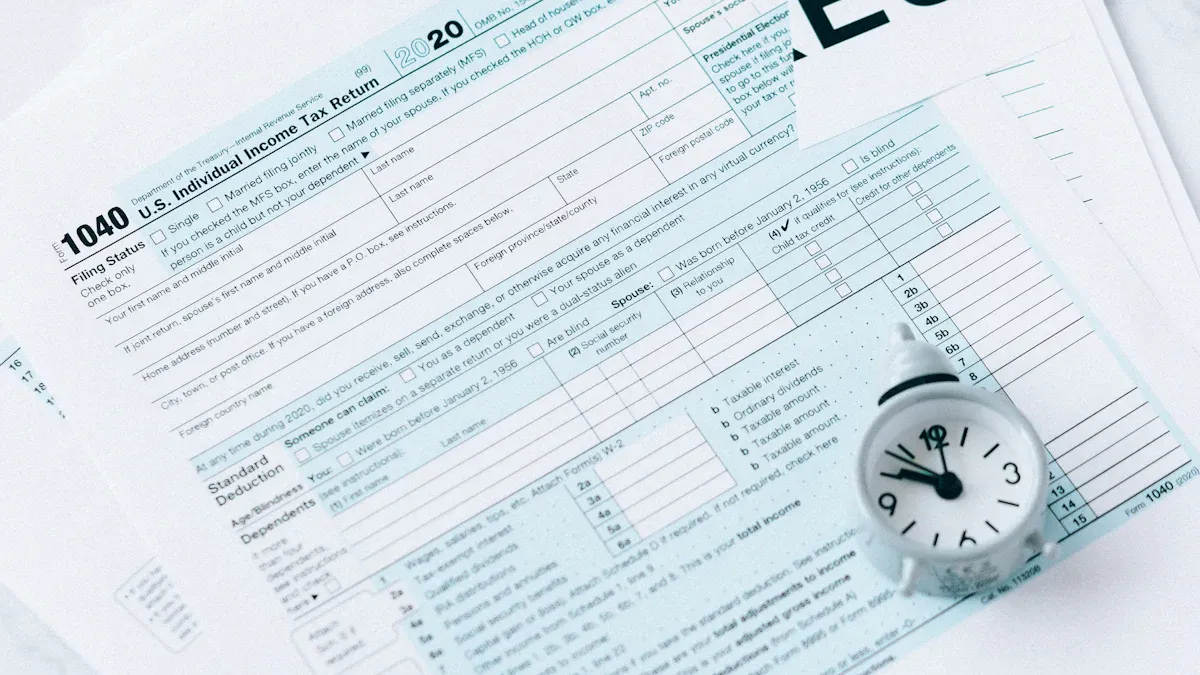- EasyCard
- Trade
- Help
- Announcement
- Academy
- SWIFT Code
- Iban Number
- Referral
- Customer Service
- Blog
- Creator
Do I need to pay stock tax? Understand the key tax rates and declaration process in one article

Image Source: pexels
Wondering if you need to pay taxes on stocks? When trading U.S. market stocks, you typically need to consider stamp duty, dividend taxes, and other levies. If you only buy stocks without selling or receiving dividends, you generally don’t owe taxes. Understanding the tax policies for different transaction types helps you avoid misinterpreting your obligations.
Key Highlights
- Selling U.S. stocks for a profit or receiving dividends usually triggers tax obligations.
- Simply buying stocks without selling or receiving dividends typically incurs no taxes.
- Regularly monitor tax policy changes to ensure compliance and avoid risks.
- Prepare complete transaction records and income proof for accurate tax filing.
- Understand tax treatments based on your investor status to choose the right filing method.
Do You Need to Pay Stock Taxes?

Image Source: pexels
When investing in U.S. stocks, you may ask, “Do I need to pay stock taxes?” The answer depends on your trading activities and tax policies. Below, we outline when taxes apply, when they don’t, and common misconceptions.
Taxable Scenarios
You typically face tax obligations in these U.S. market scenarios:
- Selling Stocks for Profit: Capital gains from selling stocks may require tax reporting. For corporate investors, gains are included in taxable income, taxed as ordinary income. Non-resident corporations without a permanent establishment face a 10% withholding tax on capital gains.
- Receiving Dividends: Cash dividends from U.S. companies incur dividend taxes. The U.S. withholds a portion upfront, but you may need to report global income to your tax authority.
- Stock Transfers: Transferring U.S. stocks via overseas brokers may require reporting gains, based on the company’s location per Chinese law.
Non-Taxable Scenarios
You usually don’t owe taxes in these cases:
- Buying Without Selling: Purchasing U.S. stocks without selling or receiving dividends generally incurs no taxes.
- Unrealized Gains: Holding stocks with unrealized profits (paper gains) isn’t a taxable event.
- Exemption Policies: Certain investors or transactions may qualify for exemptions, such as long-term holdings, though specifics depend on current policies.
Tip: Stay updated on tax policy changes to ensure compliance and avoid risks.
Common Misconceptions
When asking, “Do I need to pay stock taxes?” you might fall into these traps:
- Assuming All Trades Are Taxable: Only profits from sales or dividends trigger taxes, not every trade.
- Ignoring Global Income Reporting: Even if U.S. taxes are withheld, you must report global income to your tax authority.
- Confusing Capital Gains and Stamp Duty: Stamp duty applies to Chinese A-shares, not U.S. stocks, unlike capital gains taxes.
- Underestimating Compliance Risks: Failing to report accurately can lead to penalties or back taxes.
Before investing, consider the question “Do I need to pay stock taxes?” carefully, aligning with your situation and regulations for compliant decisions.
Main Tax Types
When investing in U.S. stocks, you encounter various taxes. Understanding these helps answer, “Do I need to pay stock taxes?” Tax policies differ across markets. Below are three primary tax types and their applications.
Capital Gains Tax
Selling U.S. stocks for a profit involves capital gains tax. In China, individual investors currently face no capital gains tax on stock trades, but corporate investors include gains in corporate income tax (CIT), with rates varying by entity and profit. U.S. tax rules may apply, depending on your status.
Dividend Tax
Receiving dividends from U.S. companies triggers dividend taxes, typically withheld at 10% in the U.S. Your tax authority may require global income reporting to avoid double taxation. Sovereign wealth funds may seek treaty exemptions, though the process is complex. Applying for dividend tax refunds can be time-consuming.
Tip: Prepare transaction records and dividend proofs for accurate filing.
Stamp Duty
In China, selling A-shares incurs a 0.1% stamp duty on transaction value, paid by the seller. U.S. stock trades typically don’t involve stamp duty. Understand market-specific rules to avoid misjudging obligations.
Tax Rates and Calculations
Capital Gains Tax Rate
For Chinese stock trades, capital gains are currently tax-exempt. When trading U.S. stocks, check local tax rules, as rates vary by holding period and investor status. Report gains in USD for accuracy.
Dividend Tax Rate
Dividend taxes in China vary by holding period. Longer holdings reduce rates. The table below shows dividend tax rate changes:
| Holding Period | Before 2005 | 2005–2012 | 2013–Sep 7, 2015 | After Sep 8, 2015 |
|---|---|---|---|---|
| <1 Month | 20% | 20% | 20% | 20% |
| 1 Month–1 Year | 20% | 10% | 10% | 10% |
| >1 Year | 20% | 10% | 5% | 0% |
Tip: Holding stocks over a year reduces dividend tax to 0%. Record holding periods accurately.
Stamp Duty Rate
For Chinese A-share sales, stamp duty is 0.1% of transaction value, paid by the seller. U.S. trades typically have no stamp duty. The table below summarizes:
| Transaction Type | Stamp Duty Rate | Payer |
|---|---|---|
| Stock Trading | 0.1% per trade | Seller |
Calculate stamp duty in USD for accuracy.
Holding Period Benefits
China offers dividend tax relief based on holding periods. Over one year, the rate drops to 0%. Shorter periods incur higher rates. Track holding periods to minimize tax burdens and clarify obligations.
Stock Tax Filing Process

Image Source: pexels
Filing Methods
In China, file U.S. stock taxes online or offline. Online filing via the tax authority’s website or app is convenient, requiring a registered account and document uploads. Offline filing involves submitting paper documents at local tax offices. Hong Kong licensed banks or overseas brokers may offer tax assistance. Check with them for support or document access.
Tip: Ensure a secure network for online filing to protect personal data.
Required Documents
Prepare these for stock tax filing:
- Transaction Records: Complete U.S. stock trade logs, including dates, quantities, prices, and fees in USD.
- Income Proof: Dividend or gain records, downloadable from broker platforms.
- Bank Statements: Transaction-related fund flows, preferably via Hong Kong bank accounts.
- Identification: ID, tax registration certificate, or similar.
- Supplementary Documents: Tax treaty proofs or U.S. withholding tax records for exemptions or credits.
Organize documents chronologically for easy verification.
Filing Deadlines
Adhere to key filing deadlines in China to avoid penalties:
| Deadline | Description |
|---|---|
| May 31 | Complete annual CIT reconciliation and filing. |
| June 30 | Report compliance and update data to agencies. |
File corporate income tax by May 31 annually. Update compliance data by June 30. Individual investors should confirm personal income tax deadlines with authorities.
Note: Prepare documents one to two months early to avoid delays or system issues.
Common Mistakes
Avoid these filing errors:
- Incomplete Documents: Missing trade or dividend records leads to incomplete filings.
- Calculation Errors: Miscalculating USD amounts or fees affects accuracy.
- Omitting Overseas Income: Failing to report U.S. stock gains violates global income rules.
- Missed Deadlines: Late filings incur penalties and back taxes.
- Incorrect Formats: Unrecognized file formats cause filing failures.
Correct errors promptly by contacting tax authorities or seeking professional help.
Tip: Maintain annual transaction and income archives to streamline filing and reduce risks.
Overseas Investments and Special Cases
Overseas Brokers
When investing in U.S. stocks via overseas brokers, you’re responsible for Chinese tax compliance. Brokers don’t file for you. Collect trade and dividend records and report per Chinese regulations. Using Hong Kong bank accounts simplifies record-keeping. Report all amounts in USD.
Global Income
As a Chinese tax resident (citizen or foreigner residing over 183 days), you must report global investment income. Overseas stock gains fall under property transfer income, taxed at 20%. Non-reporting risks five-year audits, back taxes, and penalties.
- Global income reporting is mandatory for tax residents.
- Stock capital gains face a 20% flat tax.
- Non-compliance may trigger five-year audits.
Loss Deduction
U.S. market losses can offset taxes in China. Net operating losses (NOLs) can be carried forward up to five years, or ten for high-tech/green industries. Losses offset 100% of future taxable income without annual caps.
- Losses carry forward five years, or ten for specific sectors.
- No annual cap on loss deductions.
Investor Status
Your status affects tax treatment. Individuals report global income under personal tax rules. Corporations include gains in CIT. Foreigners residing over 183 days report global income. Choose the correct filing method based on status.
Tip: Consult professionals during status changes or cross-border moves to avoid filing errors.
For U.S. stock tax filing, maintain accurate records and select the appropriate method. For complex cases, refer to this table:
| Service Type | Description |
|---|---|
| Cross-Border Tax Services | Support for tax and business structuring. |
| Global Transfer Pricing | Ensures compliance across jurisdictions. |
| Comprehensive Tax Compliance | Full federal, state, and local tax services. |
Proactive filing reduces tax risks. Consult professionals for clarity.
FAQ
How soon after selling stocks must I file taxes?
File by May 31 for the previous year’s taxes. Prepare records early to avoid delays.
Do I pay taxes if I only buy U.S. stocks without selling or dividends?
No taxes are due if you only buy without selling or receiving dividends.
How does filing differ for U.S. stock investments via Hong Kong banks?
Hong Kong banks don’t file Chinese taxes for you. Collect records and file per Chinese rules.
If U.S. dividends are withheld, do I still report in China?
Yes, report global income in China. Apply for tax credits to avoid double taxation.
Can stock investment losses offset taxes?
Yes, losses offset taxable income for up to five years. Retain loss records for filing.
Having unpacked stock taxes, you’re clear on when to pay (e.g., dividends and capital gains) and filing steps, but high cross-border fees, currency volatility, and offshore account complexities can complicate U.S. stock compliance, especially for swift remittances or position tweaks. Imagine a platform with 0.5% remittance fees, same-day global transfers, and contract limit orders with zero fees, enabling seamless U.S. stock management and tax handling via one account?
BiyaPay is built for U.S. stock investors, offering instant fiat-to-digital conversions to handle filing needs agilely. With real-time exchange rate query, monitor USD trends and transfer at optimal moments to cut costs. Covering most regions with instant arrivals, it powers quick dividend withdrawals or holdings adjustments for capital gains optimization. Crucially, trade U.S. and Hong Kong markets through a single account, leveraging contract limit orders with zero fees for holding-period-favorable limit strategies.
Whether tackling dividend withholding or capital gains filings, BiyaPay streamlines your path. Sign up now, visit stocks for U.S. prospects—quick setup unlocks cost-effective, compliant investing. Join global investors and make taxes a non-issue!
*This article is provided for general information purposes and does not constitute legal, tax or other professional advice from BiyaPay or its subsidiaries and its affiliates, and it is not intended as a substitute for obtaining advice from a financial advisor or any other professional.
We make no representations, warranties or warranties, express or implied, as to the accuracy, completeness or timeliness of the contents of this publication.




Contact Us
Company and Team
BiyaPay Products
Customer Services
is a broker-dealer registered with the U.S. Securities and Exchange Commission (SEC) (No.: 802-127417), member of the Financial Industry Regulatory Authority (FINRA) (CRD: 325027), member of the Securities Investor Protection Corporation (SIPC), and regulated by FINRA and SEC.
registered with the US Financial Crimes Enforcement Network (FinCEN), as a Money Services Business (MSB), registration number: 31000218637349, and regulated by FinCEN.
registered as Financial Service Provider (FSP number: FSP1007221) in New Zealand, and is a member of the Financial Dispute Resolution Scheme, a New Zealand independent dispute resolution service provider.



















